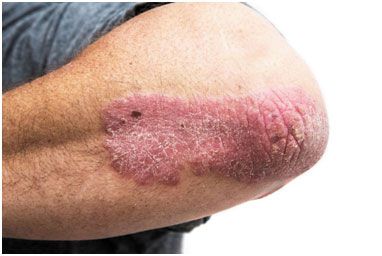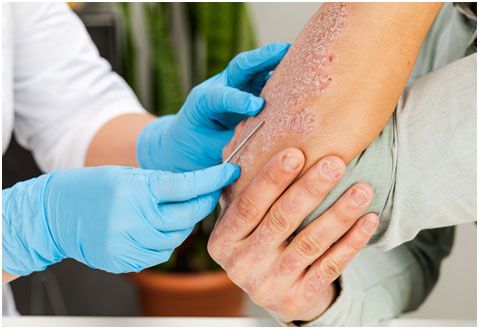If you have psoriasis, then you are one of the 7.5 million Americans with this ailment, characterized by elevated, raw, itchy plaques and scales on your skin. Psoriatic disease is one of the most widespread skin conditions, yet there are still some misconceptions regarding its causes, symptoms, and available treatments. Those who don’t understand psoriasis often think it’s just dry skin or that it’s contagious, which are not true
In this article, we debunk the most common misconceptions about psoriasis. Let’s delve into them.
1. It is just a skin condition.

Some individuals with psoriasis just have a few plaques on their elbows and no other symptoms. However, psoriasis sufferers frequently also experience additional symptoms like scalp plaques and damaged nails. They may also suffer from psoriatic arthritis or other linked problems like cardiovascular disease. Many additional issues can accompany psoriasis, making it difficult to define it with a designation as finite as ‘just’ a skin disorder.
2. It looks the same on anyone.
According to the National Psoriasis Foundation, plaque psoriasis, the most prevalent form of the illness, affects up to 80% of those who have it (NPF). Plaque psoriasis presents as raised, scaly patches of skin and frequently affects the scalp, knees, elbows, and lower back. There are four more kinds of psoriasis, including erythrodermic psoriasis, pustular psoriasis, inverse psoriasis, and guttate psoriasis, all of which manifest as small, rounded spots on the skin (a rare, potentially life-threatening form that causes the skin to shed in large sheets).
3. It is contagious
This is also another damaging misconception regarding that is absolutely wrong. Psoriasis on nails is not contagious; unlike a rash your child may have acquired at school. Psoriasis cannot be transmitted from one person to another, although the general public may not be aware of this. The social stigma of psoriatic illness can be extremely lonely. Psoriasis patients frequently feel embarrassed to strip off at the beach or pool, and wearing shorts or shirts with short sleeves might be challenging. Fighting psoriasis misconceptions might be difficult for those who want to date and experience intimacy.
In addition, psoriasis cannot be spread through direct contact between people or through the exchange of bodily fluids, such as kissing or sharing foods or drinks. Additionally, others cannot spread it in crowded public spaces like saunas or swimming pools.
4. Doctors can’t treat psoriasis

Psoriasis can be effectively treated using various methods. While it may take some trial and error to find the correct one for you, most sufferers of this condition eventually find a treatment that works for them. The success percentage usually relies on how severe the symptoms are. Topical medications, such as steroid creams and ointments, can effectively treat mild psoriasis; however, more severe cases require systemic medications, such as pills or injections. Phototherapy can also be quite successful, and immunotherapy with biologic drugs is an exciting new way that has significantly altered how we treat moderate to severe psoriasis. You can also ease symptoms by wearing best fabrics for psoriasis.
5. Psoriasis is caused by poor hygiene.
No. Food intolerances, allergies, and poor hygiene practices are not the main causes of psoriasis. Although stress can create a flare-up of psoriasis, it is not the primary cause of the condition. (Since stress can also trigger psoriasis flares, it can be challenging to say which comes first.) A psoriasis flare-up can result from catching a cold or having strep throat, [both of which trigger the immune system to react and overreact], medications, and occasionally cold weather. Some individuals can also discover that specific meals can trigger symptoms.
6. Psoriasis can be cured.
This condition cannot be cured currently. But unknown treatments exist for this persistent, lifelong illness known as psoriasis. People now have several alternatives for managing psoriasis symptoms and indications because of new options and better-established treatments.
New, potent biological medications that target the critical immune system components responsible for the illness have been developed as a result of a study into the immune system’s role in causing psoriasis.
7. It doesn’t affect children.
Psoriasis affects everyone equally. It can affect anyone, regardless of age, financial background, or skin tone – even infants and young children.
Children may inherit psoriasis from their parents because genetics is one of the main causes of the condition. A 10% risk exists that the child will also develop psoriasis if one parent does. 50% of children are likely to have it if both parents do. In America, 200,000 children aged ten and younger receive a psoriasis diagnosis yearly.
8. Psoriasis can be prevented.
This is a perplexing myth. Some psoriasis risk factors can be avoided. Your risk can be decreased by controlling your weight, stress levels, alcohol intake, and smoking. However, the disease also has a genetic component, making prevention difficult.

Namaste UI collaborates closely with clients to develop tailored guest posting strategies that align with their unique goals and target audiences. Their commitment to delivering high-quality, niche-specific content ensures that each guest post not only meets but exceeds the expectations of both clients and the hosting platforms. Connect with us on social media for the latest updates on guest posting trends, outreach strategies, and digital marketing tips. For any types of guest posting services, contact us on info[at]namasteui.com.


Hello Sourav Basak,
My herbal formulation can manage and even cure certain forms of Psoriasis & eczema. But I need help in bringing this product to millions of suffers here in USA and around the world. Can you please suggest a clear path to bring this product to the market?
Thank you,